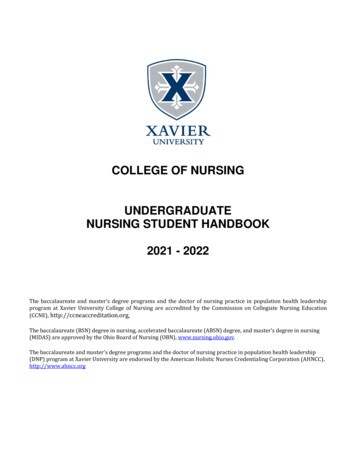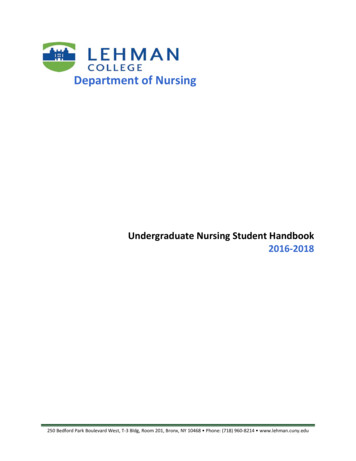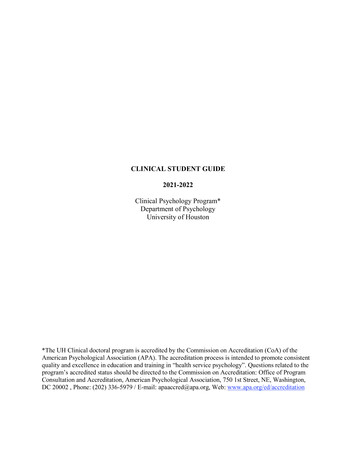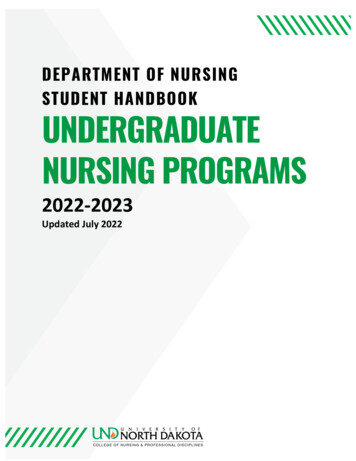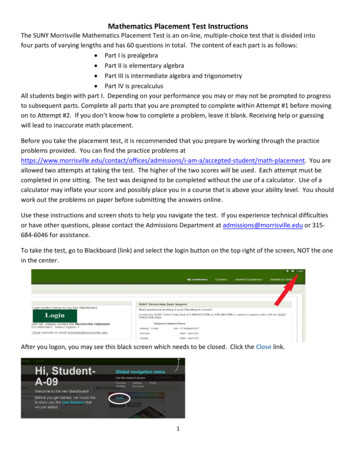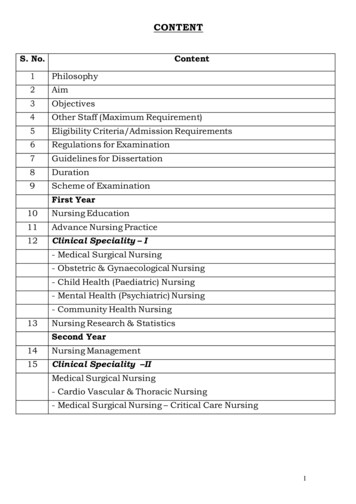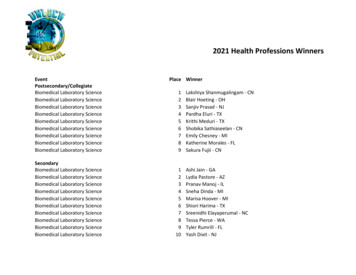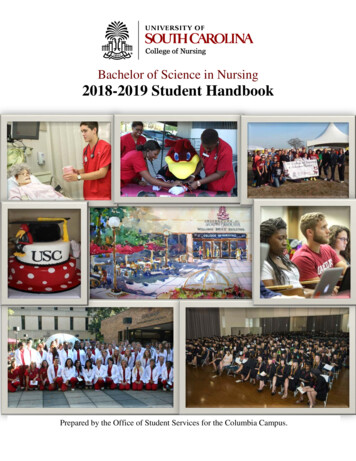
Transcription
Undergraduate Nursing StudentClinical Placement Manual
Undergraduate Nursing Student Clinical Placement ManualGoalTo provide a clear and comprehensive document that outlines the start to end processand guidelines, which govern the clinical placement for Undergraduate nursing studentsat the Royal Children’s Hospital (RCH).Target AudienceRelevant Universities who send nursing students to undertake clinical placementat the RCHRCH Education Team, this includes: Nursing Education and Development team,Clinical Nurse Educator/Facilitator (CNE/F) group and PreceptorsNurse Unit Managers (NUM) and Associate Nurse Unit Managers (ANUM) andafter hours Co-ordinators.OverviewThe Royal Children’s Hospital is committed to providing a high quality clinical experienceto final year nursing students who undertake their clinical placements at the hospital.This document has been composed to provide a clear framework for all who are involvedwith facilitating undergraduate nursing student’s clinical placements.Contents:PRE-PLACEMENT . 31. Key Contact at RCH prior to placement commencing . 32. Expected Responsibility of Universities Pre-Placement . 32.1.1.A Police Record Check . 32.1.2.A Working With Children Check . 32.1.3.Immunisations . 42.2.Legal Relationship Agreements (heading 2) . 42.3.University Declaration . 42.4.Agreement of placement numbers . 42.5.Orientation . 42.6.RCH information for Undergraduates and website . 53. Expected responsibility of the Royal Children’s Hospital Pre-Placement . 53.1.Checklist . 53.2.Expectation of Wards . 53.3.Preceptor Program . 54. Time Line. 5DURING PLACEMENT . 85. Key Contact at RCH during placement . 86. Fees . 87. Invoicing of fees . 88. RCH expectation of Undergraduate Nursing Students . 89. Confidentiality . 910.Outline of a clinical placement at RCH . 910.1.First day . 910.2.Preceptor . 910.3.Support .1010.4.Learning objectives .1010.5.Clinical Assessment Tools .1010.6.Documentation .1010.7.Medication Administration .10
10.8.Confirmation of Assessment results .1111.Preceptorship Model used at the Royal Children’s Hospital .1111.1.Undergraduate Nurse Educator .1112.Incident Management .1113.Management of Performance concerns .1214.Undergraduate Nursing Student Scope of Practice .12POST-PLACEMENT .1315.Feed back .1316.Dispute resolution .1317.Making up of hours .1318.Graduate Nurse Program .13Page 2 of 14
PRE-PLACEMENT1.Key Contact at RCH prior to placement commencingLaura TurnbullNursing EducationRoyal Children’s Hospital50 Flemington RoadParkville VIC 3052Ph: (03) 9345 5775E-mail: laura.turnbull@rch.org.au2.Expected Responsibility of Universities Pre-PlacementIt is expected that the Universities will abide by the following responsibilities toallow for an organised and consistent approach to the start of a student’s clinicalplacement within the RCH.The Universities are required to provide their students with the correct informationand within an adequate timeframe to ensure they complete:2.1.1. A Police Record CheckThe Royal Children's Hospital requires all undergraduate students to undergo aPolice Check prior to the commencement of their clinical placement. Failure tocomply with this will result in the student not being able to participate in theirclinical placement at the RCH.Results of the Police record check may also preclude undergraduate nursingstudents from taking part in a clinical placement at the RCH. Any positive policechecks must be disclosed to the RCH prior to the placement commencing.This policy is predicated on the belief that the hospital has a duty of care toprotect and not place its patients, staff, volunteers and the community inunreasonable risk; therefore, the suitability of each prospective Undergraduatestudent must be investigated prior to the commencement of their placement.Students must also be advised by the University that they will be required topresent their police check prior to commencing placement2.1.2. A Working with Children CheckAll students who undertake clinical placements at RCH are required to have aWorking with Children Check completed.Without this a student cannotparticipate in a clinical placement at RCH.The WWC Check is unique because it is monitored on an ongoing basis. Thismeans that the holder of a WWC Check will continue to be checked for any newrelevant offences or findings from professional disciplinary bodies. New charges,convictions or findings relevant to your WWC check will instigate a re-assessmentof your WWC Check eligibility.Nursing students are required to carry the Working with Children Check withthem throughout their clinical placement at the RCH.Page 3 of 14
2.1.3. ImmunisationsIt is strongly encouraged by the Royal Children’s Hospital that all students befully vaccinated prior to commencing a clinical placement at the RCH. This is notonly for the protection of the individual, but it is also for the protection of ourunique and particularly vulnerable group of patients. The list of recommendedimmunisations can be found in the appendix of the legal RelationshipAgreements.2.2. Legal Relationship AgreementsLegal Relationship Agreements need to be current and signed prior to studentsstarting placement. If a University does not have a current and signed relationshipagreement then those students will not be permitted to start their clinical placementat the Royal Children’s Hospital. It is not the sole responsibility of RCH to ensurethat agreements are current; it is the responsibility of both the RCH and the relevantUniversity.2.3. University DeclarationThe University will need to provide RCH with a signed RCH University Declarationthree (3) weeks prior to the commencement of each clinical placement group.This document will contain a declaration stating that all of the students attending therelevant clinical placement have completed the following:Police CheckWorking with Children Check.University Declaration form2.4. Agreement of placement numbersThe Universities will need to confirm in writing via the ‘Confirmation of NumbersForm’, the number of students which have been agreed upon to attend clinicalplacement for the year. The University will need to provide payment for all agreedupon students. In the event that fewer students actually attend the placement theUniversity will still be responsible for full payment of the agreed number.2.5. OrientationAll students will need to attend an undergraduate nurse orientation session prior tocommencing their clinical placement. The dates of the orientation days each yearwill be sent out by the Nurse Educator for Undergraduate nurses and also found onethe rch.org.au website. It is the responsibility of the University to inform the NurseEducator for Undergraduate Nurses three (3) weeks prior to each orientationsession, of which days the students will attend.Students who have an orientation day allocated to their first day of placement mustattend this session. Students who do not have an orientation day coinciding withtheir first day of placement are required to attend a session prior to thecommencement of their placement.Prior to attending the orientation day, students are required to complete thefollowing forms that are available via the website:An RCH confidentiality agreementAn emergency contact formHand Hygiene Australia certificate/copy of certificate (from completing theHand Hygiene Australia on line learning package).Student DeclarationThe students need to bring these forms with them to their orientation day to submitto the Undergraduate Nurse Educator.Page 4 of 14
The orientation day will be a half day of content then students will commence on theallocated unit.Students attending the orientation session on the first day of placement will beissued a “yellow lanyard” so as to identify themselves as an Undergraduate nursingstudent. These lanyards are for the clinical placement only and must be returned tothe Nurse Educator on the last day of placement.2.6. RCH Information and Website for UndergraduatesThe RCH website provides information and guidelines for undergraduate nursingstudents taking part in a clinical placement at the RCH. It is the Universitiesresponsibility to provide the students with details of this website link to enable themto gain important RCH specific information for their placement.3. Expected responsibility of the Royal Children’s Hospital Pre-PlacementNursing Education are expected to provide the Universities and the wards withrelevant information each year. This is to ensure the Universities and wards are ableto organise their staff and students effectively to ensure they are prepared for theirclinical placement.3.1. ChecklistIt is the responsibility of Nursing Education to keep a record of incoming andoutgoing information on a checklist that will record the progress of organising theclinical placements for the following year. There will also be a capacity to record anydelays or last minute amendments by the University that inhibit the clinicalplacements from being finalised. This will allow for effective feedback to be providedto the Universities regarding the overall process each year.3.2. Expectation of WardsThe Clinical Nurse Educator/Facilitator (CNE/F) group are to ensure the ward willhave trained preceptors to work with the students for the duration of the clinicalplacement. The Associate Unit Manager and CNE/F group will need to recruit andallocate Preceptors within an adequate time frame to allow for rostering and staffingneeds within the unit for the period of each placement.Allocated Preceptors need to provide the Undergraduate Nurse Educator withindividual rosters two (2) weeks prior to the students commencing their clinicalplacement. These will be sent out to the Universities for them to disseminate theinformation to their students one (1) week prior to their placement commencing.3.3. Preceptor ProgramThe Preceptorship Program is offered by Nursing Education and can be completedover one full day. The full day program will be offered regularly throughout the year(dependant on demand). Details and application forms can be obtained from theNursing Education website.4. Time LineThe Universities and Nursing Education need to ensure they provide each other withthe following information (see below) within the allocated time frames. This is toensure that all institutions are able to adequately plan for the start of eachplacement and to allow for an efficient and organised system.Page 5 of 14
Time LineRed University ResponsibilityBlack RCH ResponsibilityAugust:Universities to:Submit all requests for the following year by 31 August. This includes: Clinical placement dates Duration of placements required Number of students Clinical area preferencesEnsure there is a current signed Relationship Agreement on file.September:RCH to distribute the clinical placement yearly calendar to clinical areasfor review and confirmation. This will contain: Allocated clinical placement blocks Student numbers Allocated University for each placementWards need to confirm and request for any amendments to the yearlycalendar by 30 September.October:RCH to confirm with Universities:Number of allocated student placementsAllocated wards for each placementConfirmation of start dates and duration of each placement.November:Universities to sign and return the Confirmation of student numberallocations form.January:Nursing Education to provide the Universities with the following pertinentinformation:RCH orientation day schedule and requirements for attendanceA current list of required immunisationsRemind the Universities of their responsibility to provide a signed RCHdeclaration three (3) weeks prior to commencement of each placementregarding the following information: Police Check Working With Children CheckRCH expectation of studentsDetails of RCH online Undergraduate information and guidelinesStudent and Ward Allocation Sheet.Page 6 of 14
Time Line Cont.Red University ResponsibilityBlack RCH ResponsibilityThree weeks prior to placement:Universities to provide RCH with: Unit outline Clinical Assessment Tool Clinical Learning Objective Tools Completed Student and Ward Allocation Sheet Student attendance roster for Preceptor to complete (if required) Signed University Declaration for current placement Dates students will be attending an orientation day Up to date contact details of appropriate university contact for studentrelated issues.Nursing Education to provide RCH wards and departments with: Student and Ward Allocation Sheet - students allocated to each ward University Documentation (Unit Outline, Clinical Assessment Tool,Clinical Learning Objective Tool, Student Attendance Roster)Nursing Education to request wards to provide student rosters for clinicalplacementNursing Education to complete checklist to ensure all relevant informationhas been gathered and circulated to the CNE/CNFs and Preceptors prior tothe clinical placement commencing.One week prior to placement:Nursing Education to provide Universities with: Individual student rosters from each allocated ward to provide studentswith their daily roster for the duration of their placement Commencement time and location for first day of placement if student isnot attending orientation day on the first day of placement (previouslyadvised in Student Information book)University to provide students with: Individual rosters for placement First day information Ensure they have details of the online orientation.Page 7 of 14
DURING PLACEMENT5.Key Contact at RCH during placement:Laura TurnbullUndergraduate Nurse EducatorNursing EducationRoyal Children’s HospitalFlemington RoadParkville VIC 3052Ph: (03) 9345 5775E-mail: laura.turnbull@rch.org.au6.FeesAs of 2011, the fee for one student to undertake a clinical placement at the RCHis: 55 ( GST) per student / per day. This will be reviewed yearly.7.Invoicing of FeesInvoices will be raised with the RCH Finance Department by Nursing Education atthe commencement of each clinical placement. The RCH Finance Department willsend invoices to each University during the clinical placement.The University has 30 days to complete payment of the invoice to the FinanceDepartment at the Royal Children’s Hospital.8.RCH expectation of Undergraduate Nursing StudentsIt is the expectation of the Royal Children’s Hospital that Undergraduate nursingstudents adhere to the following standard:Students will:Attend an RCH orientation day prior to commencing their clinical placementSign an RCH Privacy and Confidentiality agreementThe learning objectives for the clinical placement will be completed indiscussion with the allocated Preceptor within two (2) days of starting theirplacementHave a copy of the University provided clinical assessment tools prior to thecommencement of their placementComplete a Clinical Assessment Tool with the allocated Preceptor at the endof each placement and have it stamped by Nursing Education prior to leavingthe hospitalAdhere to the RCH code of conductAdhere to the RCH Undergraduate Nursing Student Scope of PracticeBe expected to wear appropriate attire and attend placement prepared withall necessary equipment that may be required for the placement i.e. pens,scissors, pen torch, reference material etc.Further expectations for students to read are listed on the RCH website.Page 8 of 14
9.ConfidentialityWe respect the privacy of our patients, families and staff. All students will beasked to sign an RCH confidentiality document. Students will need to sign andbring this with them to orientation. Any breach in confidentiality will result in thestudent being asked to leave their placement effective immediately.Examples of a breach of confidentiality include:Divulging patient or staff information without consentAccessing information that is not relevant to direct patient careDiscussing patient or staff information within anyone other than anotherhealth care worker and only when relevant to a patient assignmentGossiping about patients or staffDiscussing patient information in lifts or corridors where it could be overheardby unauthorised personnelLeaving written information regarding a patient in view of unauthorisedpersonnelAccessing pathology results of family, friends or co-workersPosting any information pertaining to patient, organisation, or staff on anysocial networking sites such as Facebook, Myspace, Twitter etc.RCH Policies and Procedures: Personal Information - Confidentiality10. Outline of a Clinical Placement at RCHThree weeks prior to placements commencing, the University needs to provide theNursing Education with a completed Student and Ward Allocation sheet as providedin January of each year. One week prior to the placement the Nursing Educationwill provide the University with individual student rosters. It is then responsibilityof the Universities to ensure the students know which ward is allocated to themand what shifts they will be working for their clinical placement.10.1. First dayOn the first day of placement students will either:1. Attend the orientation day session and then proceed to their allocated clinicalarea in the afternoon, or2. Meet the Undergraduate Nurse Educator at a specified time to be taken totheir allocated ward (only if there was no orientation day session allocated fortheir first day of placement)The ward will also provide ward specific orientation to the undergraduate nursingstudent on the first day.10.2. PreceptorEach student will be allocated a Preceptor for the time they are on placement at RCH(except in specific circumstances and not in the Emergency Department andtheatre). The students will attend each day based on the Preceptor’s roster. Thiswill require the student to work all the same shifts, including weekends and nightduty.It will be at the Preceptor’s discretion as to how they will work with the student. Thestudent will be required to work within the ‘RCH Scope of Practice for UndergraduatePage 9 of 14
Nursing Students’ (see below) but it will be up to the Preceptor and based on theindividual students standard and competence as to what tasks are performed and tohow the workload is allocated and shared.It is recommended (but not required) that Preceptors have either completed the RCH(or equivalent) Preceptor training or will be undertaking the training at some stageduring that year. If training has not taken place, CNE/F’s will need to provideincreased support to the Preceptor.10.3. SupportSupport for the student during their placement will be provided by a team approach.This team consists of: the Preceptor, the ward Education Team - Clinical NurseEducators and Clinical Nurse Facilitators and the Undergraduate Nurse Educator.These individuals will have varying involvement with the student based on thestudent’s performance and feedback from the Preceptor.10.4. Learning ObjectivesIt is expected that each student arrives at the placement with the appropriateUniversity learning objective tools. Students should have begun the process ofthinking about what learning objectives will be relevant for them on this placement.Within two (2) days of beginning their placement, the student will be allocated timewith their Preceptor to formulate the appropriate learning objectives for the currentplacement.10.5. Clinical Assessment ToolsIt is expected that each student arrives at the placement with the appropriateuniversities clinical assessment tools. The clinical assessment tool will be completedby the Preceptor and the student at an agreed time near the end of the rotation.10.6. DocumentationUndergraduate nursing students are required to keep patient documentation up todate in the same manner as is expected on the ward they are working on. Thestudent is required to make an entry in the patient record as governed by thePreceptor.All written entries in patient records must be legible and signed by the student.Students can only make entries within the medical record when they are authorisedto do so by their Preceptor. Each entry must be dated, signed, include full name andstate that they are a student nurse. Each entry should be countersigned andamended (if required) by the student's Preceptor.10.7. Medication AdministrationUndergraduate Nursing Students at the RCH are allowed to administer medicationunder the following guidelines:Completion of the hospital based generic drug test is mandatory prior to drugadministration. This will be completed at orientation and given to theappropriate ward CNE/F’s by the Undergraduate Nurse Educator.Only to administer medication under the direct supervision of an RCHemployed Division 1 Registered Nurse (as per RCH policy)For medication requiring double checking, undergraduate nursing students arenot authorised to be “checkers” of medication (as per RCH policy)Undergraduate nurses are expected to be able to verbalise information aboutthe drug they are giving prior to administrationExpected to know the 6R’s (as based on the RCH policy) and apply them toeach administration of medication ensuring that the: right child receives the right medication the right dosePage 10 of 14
at the right time by the right route and for the right to refuse10.8. Confirmation of Assessment ResultsOnce the student has completed the clinical assessment tool with the Preceptor, thestudent is required to bring the clinical assessment tool directly to Nursing Educationto be stamped as authentic and completed to the University Standard.11. Preceptorship Model used at the Royal Children’s HospitalThe Royal Children’s Hospital has adopted a model of clinical education forundergraduate nursing students based on the use of preceptorship. Clinicalsupport for the Preceptor will be provided by RCH education staff rather thanclinical teachers.Each student in the Preceptorship Model will be allocated a Preceptor and will workwith that Preceptor for the duration of their placement. In the event that thePreceptor is unable to attend work due to illness or personal matters, anotherPreceptor will be allocated to that student until the original Preceptor returns.The Preceptor will be supported by the ward based Clinical NurseEducators/Facilitators.They will be available to support the Preceptor asrequested and needed. If the Preceptor has any difficulties with the student, theCNE/F team will increase the support they provide (see: Management ofperformance concerns) along with the Undergraduate Nurse Educator.11.1. Undergraduate Nurse EducatorThe overall role of the Undergraduate Educator will include:Organising, coordinating and running orientation sessionsVisiting the wards and students on a regular basis to monitor how eachstudent is progressingSupporting the preceptor and the CNE/F’sAssisting with completing learning objectivesAssisting with completing clinical assessment toolsEnsuring ward staff are familiar with the university tools that will be used foreach placementLiaising with the Universities regarding student issuesWorking with staff to resolve performance problems and manage incidentsFor the Emergency Department, oversee general student issues and Liaisewith the Universities on behalf of these units for student problems and issues.12. Incident ManagementPlease refer to the attached document titled ‘Management and Reporting ofUndergraduate Nurse Incidents during clinical placement at the ting Incidents of UGrad Nurses.pdf) for dealing with incidents.This procedure is based on the RCH ‘Risk Management Procedure for Staff’ and isto be used as an adjunct to this only. The procedure was created to particularlyassist in the lines of reporting for all parties involved, as this also involves anoutside body (the Universities).Please refer to the attached documents:Risk management procedure for staff (RCH policy and procedure)(http://www.rch.org.au/policy rch/?doc id 12325)Page 11 of 14
Management and reporting of undergraduate nurse incidents during clinicalplacement at g Incidents of UGrad Nurses.pdf).13. Management of Performance concernsThe Process for Managing Performance Concerns for an Undergraduate NursingStudent is contained within the document ‘Management and Reporting ofPerformance Concerns for Undergraduate Nurses on Clinical Placement at the RCH’This procedure also outlines the process for appropriate reporting of performanceconcerns.14. Undergraduate Nursing Student Scope of Practice.Attached is the RCH ‘Undergraduate Nursing Student Scope of Practice’, which is tobe adhered to while on placement at the RCH The RCH only accepts nursingstudents who are in the final year of their degree and as such the Scope of Practicehas been written commensurate to that skill level.Page 12 of 14
POST-PLACEMENT15. FeedbackEach student will be asked to complete a feedback form once their clinicalplacement has been completed. This can be completed when they return theiryellow lanyard and have their Clinical Assessment Tool documentation to bestamped. Within this, they will be able to evaluate their clinical placement at RCH.The feedback will be used to evaluate and improve the Undergraduate nursingprogram.16. Dispute resolutionIn the event that a student disputes a failed placement, a resolution process canbe initiated by either the University or Nursing Education.This will be anopportunity for a meeting to be held between the student, the University and arepresentative from Nursing Education as an attempt to resolve the dispute.17. Making up of hoursDue to clinical placement demand RCH is unable to provide make up hours thathave been lost while on placement at other hospitals. This includes students whohave applied for and gained a place as a Graduate Nurse at RCH.18. Graduate Nurse ProgramThe RCH welcomes all applications from undergraduate nursing students who havebeen on clinical placement at the RCH, to take part in our Graduate NurseProgram.Page 13 of 14
University will still be responsible for full payment of the agreed number. 2.5. Orientation . The Preceptorship Program is offered by Nursing Education and can be completed over one full day. The full day program will be offered regularly throughout the year (dependant on demand). Details and application forms can be obtained from the
